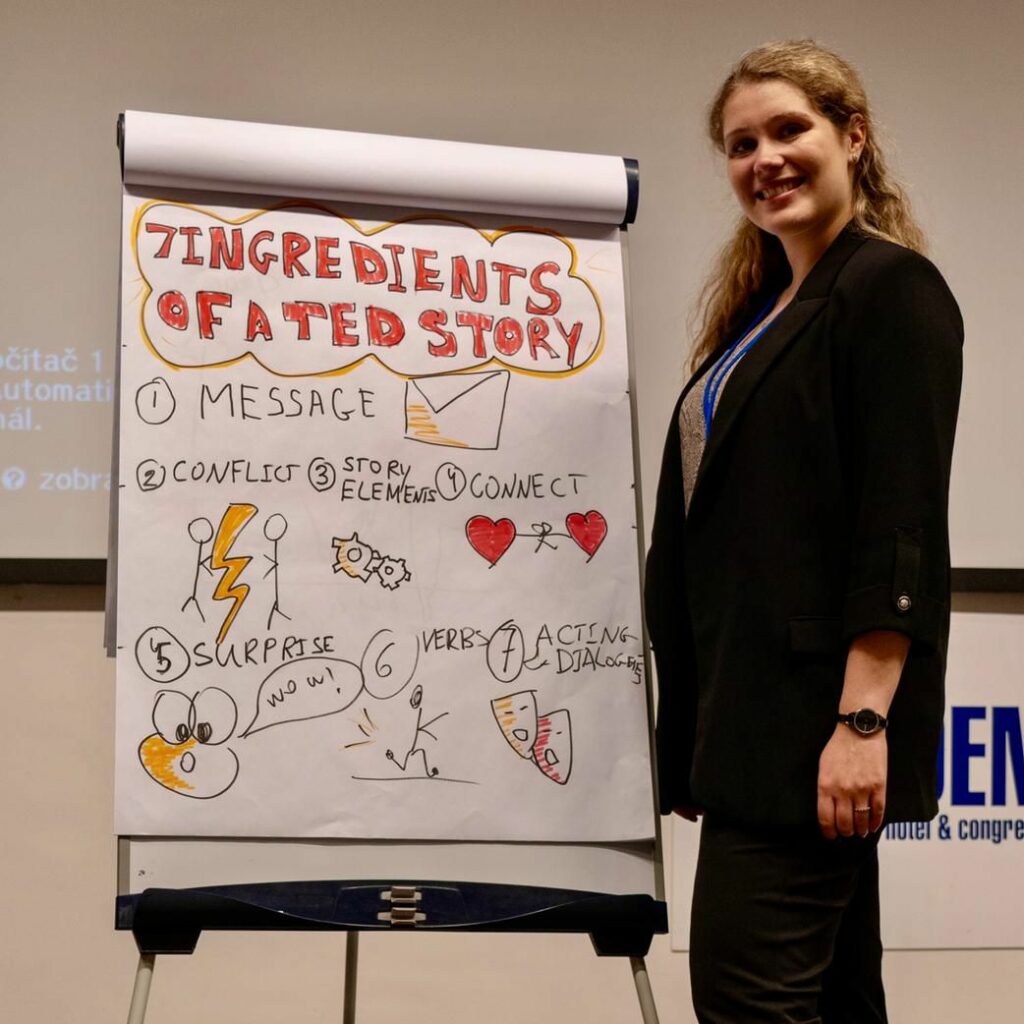I met Diana in Autumn 2018 when she organised the winter 2018 Moscow Toastmasters conference. She later moved to London and served as conference director for the Toastmasters District 91 spring conference. There, she spearheaded the transition from a world-class in person event to a world-class online event. Last year she launched Skillsme Academy and I recently attended her highly rated storytelling course.

Thank you for your time, Diana. We’ve known each other for about two years and you were initially a conference organiser in Toastmasters. Recently you launched webinars and workshops on storytelling.
Why storytelling? Why this interest and passion for storytelling?
As you know, I’ve been a very active Toastmasters member, not only as an organiser but also as a speaker. On the third level of my Pathways, there was a project called storytelling. I always thought, “Okay, well, telling good stories is something that I could never do. So maybe, after this project, it will change.” I had a good look at the project but it didn’t answer my main question: how do I tell a good story? So, I started to look for more information elsewhere which ended up becoming a whole journey. I realised that the topic is so big because stories are not only told to entertain. They’re a great tool to explain complex ideas, to build trust and connection, to be remembered and, most importantly, to influence people’s behaviour. And there are certain techniques to tell stories effectively. Techniques which can be learned very quickly. And the amazing thing is that anybody can learn them!
Would you then say that storytelling is all about content rather than delivery?
I’m not saying stories are only about content. But I think content plays a more important role in a story than the delivery. The delivery is important, yes, but without the content, you won’t have a good story. Also, we shouldn’t forget that stories can be written too and then they become only about the quality of content.
That’s very interesting because there are a lot of people out there who believe that being a good speaker or a good storyteller is all about the delivery. It is also good advice for people who might be nervous about public speaking.
In your recent course, you taught storytelling techniques and methods. But for you, if you had a quintessential example of a good story that perhaps is pretty well known, what would it be and why?
The basic storytelling structure is used not only in verbal stories but also in written stories, such as books and movie scripts. An example of a movie I personally like is The Pursuit of Happiness. This is the story of a man who always wanted to be successful in his career and as a father. He invests his savings in various business ventures but these are unsuccessful. His wife asks him to get a normal job but he wants more and this creates a conflict with her. At one point in the movie, the hero, acted by Will Smith, is broke and has to sleep in a public toilet with his child. There he reaches the lowest emotional point . What could be worse than sleeping in a public toilet right? Despite this, he receives an offer for an unpaid internship in a well-known financial firm, something which could lead to success and financial stability down the line. At the end of the day, things work out, he becomes very successful and he later owns his trading firm.
If you notice it, we have a fundamental storytelling structure here called a “man in a hole”. Things start being okay, but then they get worse and worse until they reach that low point. While the hero tries to get out, not everything works out well immediately. Conflicts and struggles continue until eventually everything becomes even better than at the beginning of the story. This is, I would say, a very traditional structure for any story. And I think it’s a great example.
I’ve never watched that movie, but your description makes me kind of curious about it. You also did something very effective while describing it too as you painted mental images in my head. This is what telling stories can do.
What are your thoughts on suspense in storytelling?
We tell stories every day. I wouldn’t be surprised if you, Florian, have told five stories today, even without leaving your house. Even answering the question “How has your day been” can be a story. We sometimes forget that a good part of our speech is storytelling. Which is why if you work on it, all your everyday conversations suddenly become much better. Suspense is fundamentally about not giving listeners any ideas about what could happen next. Because if you do, you can ruin the story and people won’t want to continue listening to you. Suspense allows them to guess in their minds what will happen next. The less information you give, the better your story becomes. It doesn’t matter if you tell it on stage, or just tell me in a casual chat.

Now, you are a very experienced storyteller. So, have you ever noticed now that watching a movie, or even reading a novel, can actually be more challenging now? Because you may be able to see what comes next?
I know what you’re talking about, Florian. It’s now much harder to impress me. But there are some really creative scriptwriters out there. For example, I recently watched a movie called The Gentlemen. I recommend watching it from the storytelling perspective. Guy Ritchie structured it in an interesting way because he has not told the story in the correct order, which is normally very dangerous because many people can misunderstand it. And generally, in normal conversations, I strongly suggest against this approach. I tried this once in a speech about my trip to China which I started from the end, and then the entire story was a flashback. Afterwards, half of the audience loved the story but the other half was confused. In this movie, they made several flashbacks that you don’t expect. But they were done in a very clever way and it made the movie stand out.
As somebody interested in the science and technique of storytelling? What are your plans now?
To spread my love of storytelling and educating more people about it. I would say that’s done through conferences or various events. I am also preparing for the next course which will have a totally different structure to enable more people to attend it.
Let’s have a final piece of advice for the readers. What piece of practical advice could you give them in a few sentences?
Tell more stories! If you want people to listen to you, if you want to be able to persuade others and want people to understand you better and connect with you as a human being, than being just some sort of robot throwing information at them, become a storyteller!